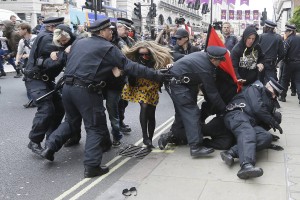The UK government is making the final preparations for the 39th G8 summit in Northern Island this week, due to take place between 17-16 June at the Lough Erne resort, County Fermanagh.
The sixth G8 meeting to be held in the United Kingdom, it will see the gathering of the leaders of the world’s eight wealthiest countries in terms of net wealth: David Cameron (UK), Stephen Harper (Canada), François Hollande (France), Angela Merkel (Germany), Enrico Letta (Italy), Shinzō Abe (Japan), Vladmir Putin (Russia) and Barack Obama (USA).
Yet the summit has not been without its critics.
The choice of Northern Island as a location has been widely criticised due to a number of security fears, sparked by ongoing protests and small-scale violence in the region by both republican and loyalist groups.
In February a Whitehall source claimed that MI5 had unearthed a plot by a combination of renegade militant groups calling themselves the New IRA and numbering around 700. The terrorist group was said to be planning a bomb attack on the luxury resort, in a “cowardly” attempt to “hijack global headlines.”
Later in March a car bomb was discovered in the region, which the militant group Oglaigh Na hEireann later claimed was intended for this week’s summit.
David Cameron has nonetheless been adamant about the choice of location, stating that it would have been “unthinkable” twenty years ago.
“Northern Ireland’s prospects have been transformed by the peace process in the last twenty years, and I think we’ll be able to show the world this is a modern and dynamic part of the United Kingdom”, he said this week.
Yet there were further highly publicised protests earlier this week by anti-capitalist groups in London.
Nearly 1,200 riot police clashed with protestors holding a “Carnival Against Capitalism” in London’s Soho district. Using chainsaws, police broke into the protestors’ base on Beak Street, where they flushed out the occupants and made 57 arrests for offences including criminal damage, assault on police and possession of an offensive weapon.
Police then chased groups of shouting protesters down Oxford Street and Regent Street, and towards Grosvenor Square, Mayfair, home of the US embassy.
The protestors, part of the StopG8 group, waved black, green and red flags and carried banners bearing slogans such as “No borders, no prisons, no capitalism” and “One Common Struggle.”
“We want to make a statement that capitalism is screwing the majority of people,” said one. “If we were in Taksim Square [Turkey] people would say we were anti-government protesters. Here they probably call us a mob.”
The agenda for next week’s summit is varied. Speaking at the World Economic Forum in April, Cameron stated that the three main areas of discussion will be trade development, tax compliance, and political transparency.
“The UK’s G8 Presidency will aim to lay the foundations of long-term growth and prosperity for generations to come, underpinned by the development of open economies, open governments and open societies” ran an official press release.
But this week Cameron added that a new focus at the summit will be the situation in Syria. The Prime Minister claims he will put pressure on Russia’s Vladmir Putin to agree to the convening of a peace conference in Geneva.
“We should use the G8 to try and bring pressure on all sides to bring about … a peace process, and a move towards a transitional government in Syria,” Cameron told Parliament.
The cost of the summit is expected to be about £60 million, with the Northern Ireland government paying £6 million and the UK government funding the remainder.










